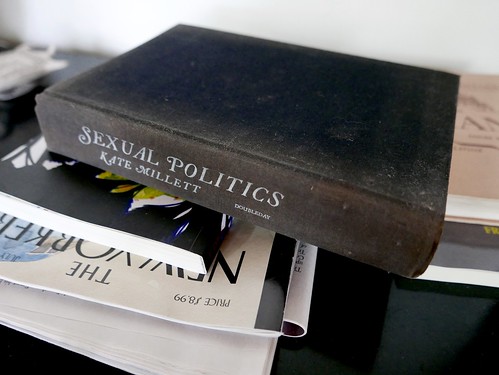I don't watch this show, and there's no way I will, but I do read The New Yorker, and that means I'm often challenging myself to understand TV shows (and movies) that I do not and will not watch. I'm keeping an eye on the culture from the safe distance of reading. For example, I read this about the Emmys show, which I did not watch:
“I haven’t had a TV since I moved out of my parents house at 18,” [Shailene Woodley] told E! News in the pre-show on the red carpet at the 2017 Emmy Awards Sunday, where Big Little Lies had received 16 nominations.
“All my friends who watch TV, I always ask them when they have time to. When do they have time to?” she said. “I’m a reader. I always have a book.”
That's reported at People under the headline
"Shailene Woodley Slammed After Revealing She Doesn't Own a TV on Emmys Red Carpet: 'I'm a Reader.'" Slammed? Why? Actors are supposed to tout the industry? Or does claiming to be "a reader" sound snobby? Tell me what books Shailene Woodley reads and I'll have an opinion on that. It seems to me many of these TV shows and ponderous and hard work to watch, and lots of books are lightweight. My preference for reading is more about wanting control of my own time, to go fast or slow, to switch into my own thoughts, and to retrace my path and skip around.
Ah! I found
an answer to the question what books does Shailene Woodley read:
[Shailene's] favorite is Henry and June by Anaïs Nin, a memoir about the author's passionate love for Henry Miller and his wife, June. "Anaïs is like the ultimate goddess," Shailene says. "I feel really connected to her femininity." Much like we feel connected to your femininity, Shai. (Did that sound creepy?)
That's Teen Vogue, which might explain the cutesy dancing around carnality. So, onto the subject of the New Yorker article:
"'The Deuce' and the Birth of Porn/The show is a classic David Simon joint, in which sex workers and porn actors are treated like any other alienated workforce," by Emily Nussbaum:
“The Deuce” is certainly a feminist series—and half its directors are female—but its smartest move is to resist turning sex into a thesis, exploiting the contradictions instead.
You're a connoisseur of contradictions, a resister of sex as a thesis, and yet you dictate to me: "'The Deuce' is certainly a feminist series." Why the certainty?! Why shut the door to the exploration of contradictions in the contention that this show — about pornography — is certainly feminist? I'm outraged by this pronouncement. I would
begin with the hypothesis that a show about pornography is anti-feminist, but you want me not even to think about it.
I continue reading this article precisely because I'm so annoyed:
Often, this means visually scrambling cable clichés, starting with a rape role-play in the première that spills into genuine violence. In the aftermath, Darlene, dabbing her bruises, is nude, but she’s never the camera’s focus. Instead, our gaze keeps settling, with nosy clarity, on her bald trick’s big-bellied torso, his matted back hair, his exposed crotch, forcing us to consider that body—both pathetic and intimidating—not hers.
There’s warmth, too, particularly through [Maggie] Gyllenhaal’s mournful, electric presence, her fame itself upending the hierarchies of cable, which typically dictates that extras bare it all while the stars cover up. With the polarities reversed, and the biggest celebrity somehow exposed and not objectified, I found myself craving a sex scene between the one non-sex-worker African-American couple on the show: in this context, such a sequence became elevating, not debasing, a sign that the characters were taken seriously enough to see their private world.
What is the argument that this is even uncertainly feminist? I really have no idea. Getting the star to go nude is
an old trick, and not one I associate with feminism. Showing an ugly man having sex with a beautiful woman is a
tale as old as time. Maybe somehow the graphic depiction of rape and the bruised body of a woman is supposed to be flipped into something meaningful, but Nussbaum doesn't explain how this happens and why this isn't just another way to palm off the same misogyny that the recently departed Kate Millett wrote about in "Sexual Politics."
Is it that half of the directors of "Deuce" are women? So they hire on women to get immunity from the charge of misogyny. We're supposed to support the furthering of the careers of women and see that as feminism. Could Nussbaum please explain why the gambit of hiring women to work on projects like this is certainly feminist and not actively anti-feminist?
There's always a woman who will take the work. They can put the face of a woman on any project they want. Is it that easy to get the Certainly Feminist stamp? (If so, porn itself is certainly feminist.)




